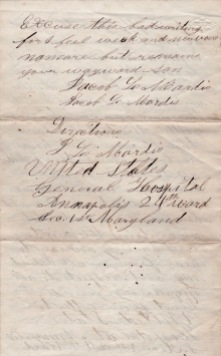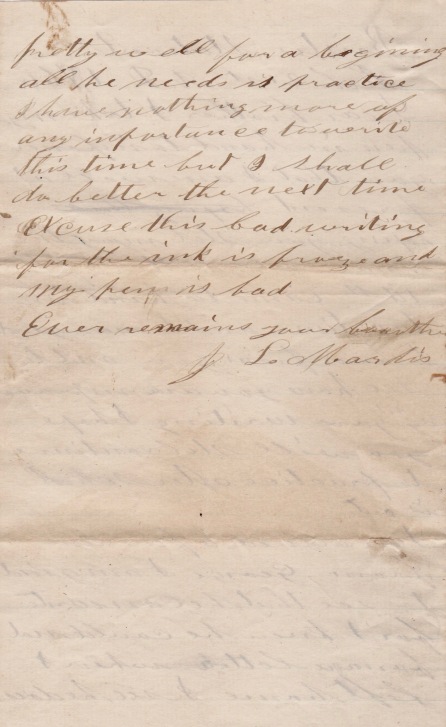These letters were written by Jacob L. Mardis (1841-1864) to his parents, Joseph S. Mardis (1818-1888) and Mary (“Polly”) George (1819-1893) of Blacklick township, Cambria county, Pennsylvania. In the 1860 federal census of Blacklick Township, Jacob was 19 years old and enumerated as the son of Joseph S. Mardis (age 44) and Anna Marie (or Mary) Mardis (age 41). The occupation of both Jacob and his father was listed as farmer. Jacob’s siblings included Cyrus J. (age 14), George (age 11), and Elizabeth (age 10)
Jacob was recruited into Co. A, 40th PA Infantry Volunteers (11th PA Reserves) on August 29, 1862 and joined his regiment just prior to the Battle of South Mountain and Antietam. He was taken as a prisoner of war twice. First, he was wounded and captured at Fredricksburg, Virginia, on December 13, 1862. Jacob was later released at City Point, Virginia, on January 12, 1863. On May 30, 1864, Jacob was captured at Mechanicsville, Virginia, and transported to Andersonville in Georgia where he died from dysentery as a prisoner on August 9, 1864, aged 23. He was buried in a nearby plot at the national cemetery, now designated with Andersonville Marker #5130. Jacob’s military record will show that he was transferred into the Co. A, 190th Pennsylvania Infantry in May 1864 as the original regiment concluded its three years service in that month.
[Note: These letters are from the personal collection of Jim Doncaster and are published by express consent. The header image was taken during a reenactment at Fredericksburg by the Civil War 150 Pinhole Project.]

TRANSCRIPTION LETTER ONE
Annapolis, Maryland
January 1863
Dear Parents,
I was taken prisoner at Fredericksburg on the 13th of December 1862 and am very thankful to the Almighty for the preservation of my life through the many dangers I passed. While many fell on both sides, I escaped with a slight would in the thigh which disabled [me] so that I could not follow the regiment. I was taken to Richmond and paroled and there we had to lay in prison four weeks among lice and dirt and not half enough to eat. I caught cold while I was there for I had no clothing except what I had on as I lost my knapsack on the battlefield.
On my way coming from City Point on the boats to Annapolis, I took sick with the measles. There was none among the prisoners that knew [how], or any person on to take care of me, [so] I concluded it would be best to go to the hospital. I am now getting better as I am very well taken care of and I hope in a few days I will be as well as ever. By coming [to the hospital], I got rid of the lice and got a change of clothes. The rest of the prisoners that were on the boat were taken to Parole Camp where they will [be] kept until duly exchanged and then of course we will [be] sent to our regiments.
I am without a cent of money as our regiment did not get paid off before the fight at Fredericksburg and it is not known when we will be paid off. If you send me any money, I would advise you not to send much.
I wish this war was over for I am getting tired of it. I have thought more about home the last four weeks that I did all the time before. I want you to write to me soon and let me know how you all are and what you are doing this winter for I am very anxious to hear from you all. I send my best respects to all enquiring friends.
Direct your letter to United States Hospital at Annapolis, Section 1st, 24th Ward.
Excuse this bad writing for I feel weak and nervous. No more but remain your wayward son, — Jacob L. Mardis
Directions:
J. L. Mardis
United States General Hospital
Annapolis, Maryland
Section 1st, 24th Ward
TRANSCRIPTION LETTER TWO
Bristoe Station, Va.
February 21st 1864
Dear brother,
I take my pen in hand to inform you that I am well at present, hoping you still enjoy the same. Your letter of the 14th came to hand in due time and I was glad to hear from you and to see how you are improving in your writing. I hope you will still continue to practice after school is out.
I received a few lines from George. I am glad to see that he can write for I knew he could not form a letter when I left home. I see he does pretty well for a beginning. All he needs is practice.
I have nothing more of any importance to write this time but I shall do better the next time. Excuse this bad writing for the ink is froze and my pen is bad. Ever your brother, — J. L. Mardis
TRANSCRIPTION LETTER THREE
Bristoe Station, Virginia
April 22, 1864
Dear Parents,
I seat myself this evening to write a few lines in answer to your kind and welcome letter of the 24th which I received this evening and was glad to hear from home once more that you are all well which is ever cheering to me. I am happy to inform you that I enjoy as good a heath as ever I did in my life. This is the second letter I have written to you as I received your letter that I thought was lost. I answered it with a portion addressed to Cyrus.
I have heard nothing more concerning the recruits. Mr. Sloan says he will do all he can for us and said the understanding was that we would be discharged with the regiment. It is not known yet when the regiment will be discharged for there was an order read the other evening that the regiment would be discharged three years from the date of muster into the United States service. According to that, it would not be discharged until the 29th of July but that is not reliable. They order may yet be countermanded.
You want to know when you shall send the evidence of our enlistment. Patterson and Brown think if they go to give us trouble, it would be well to send it right away, so do as you think best. Benjamin Davis, a recruit from the Cherry tree, requests you to get testimony [from] Judge Kincade as he would be a good witness for us. Also Titsinger and Samuel Reed and as many others as you can get.
It is reported that some of the troops received orders that no mail would go out for sixty days but we can receive letters, so do not be discouraged should you not hear from me. Tell Mother to keep in good heart. The thought of her is often in my mind. I am sorry to hear that she is uneasy about me indulging in bad habits. I have not done so yet. I have not been drunk since I have been in the service and I think I shall not.
Excuse this bad writing for my pen is bad. Write soon. I stated in the other letter that I sent 40 dollars to A. A. Barker for you to left. No more but remain your son, — Jacob L. Mardis








